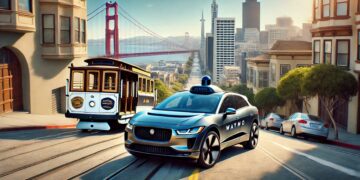Driving in Boston is a sport. Locals pride themselves on agile sidestepping, creative interpretations of traffic lights, and playing upon other drivers’ hesitation and insecurities. It is stimulating, even fun. A little sweet revenge and—oh yeah—dangerous.
Allstate again ranked Boston with the #1 riskiest drivers of the 200 most populous US cities. True Bostonians smirk, knowing that it’s true and yet privately welcome that daily adrenaline rush. But how will this culture square with innovation like self-driving cars?
Waymo, arguably the top robotaxi company, operates hundreds of thousands of rides per week in LA, San Francisco, Phoenix, Atlanta and Austin. Boston is on deck. It shares winter snow and ice conditions with other new target cities, but what sets Boston apart are the rules of the road, understood only by locals, and dangers therein. These unwritten codes just might foil self-driving car’s safety-first design. It might make them undesirable.
Jared Johnson’s opinion in CommonWealth Beacon identified all the ways Boston has lead in transit innovation historically. He warns of complacency and lack of leadership, illustrating that there has been pressure to slow or even stop the proliferation of self-driving vehicles in Boston. The city council is actively considering regulations to delay the inevitable technical advances in car technology, influenced by taxi drivers and concerns of traffic conditions. But ignoring the proven successes by Waymo and others, Boston risks a politically motivated slowdown.
Self-driving cars will happen. Just like the demise of horse drawn buggies, land-line telephones, and even the traditional taxis with disruption from Uber and Lyft, society changes with technical progress. Can that eventuality be thwarted by Boston drivers? Might the region’s high-tech economy be threatened by both the bad drivers and active legislation? Here are three possibilities: Nirvana; Ho-Hum; and Domination.
- Nirvana: a best-case scenario. Waymo enters the market with its good driving habits: defensive driving; considerate of other drivers; and flawless observation of signals, signs and others’ rights of way. This leads Boston drivers to begin emulating calm, lawful and respectful habits. The roads get safer, traffic moves more smoothly, and Boston loses their reputation—for the better. Chances? Think: Powerball jackpot.
- Ho-hum: Waymo joins the throngs of taxis, and no one really notices. Waymo cars get cut off regularly, dodge red-light runners, and get flipped off often. In other words, just like every other Boston driver. Nothing changes, life goes on. Somewhat more convenient and safer, though generally unremarkable. This is the general experience in other cities. However, Boston is uniquely special. Bostonians are unlikely to stand for a ride slower than their aggressive counterparts.
- Domination: Boston drivers realize these “robo-wimps” are pushovers. They must yield and won’t retaliate. Cutting them off is easy. Intimidation works every time. Waymos cower in the face of aggressive behaviors by others as their riders get frustrated. The riders watch helplessly as other drivers snicker at their dominance over the bots, knowing their prey remains feeble. Waymo becomes a joke. Riders gravitate back to the tried-and-true aggressive human driven taxis, Ubers, and Lyfts, who pride themselves on their Boston skills.
The odds favor this “Domination” scenario—their pride and reputation intact.
This is the worst outcome. Not just for the obvious safety, traffic flow, and congestion, but importantly for the future of technology. Boston is a progressive society and a hub of innovation with leading research, tech companies, and best-in-class universities. San Francisco, the other great tech capital, is already three years into robotaxi commercial operation. Austin also has two years under its belt. If autonomous vehicles flounder in Boston—not because of weather, infrastructure, or even legislation, but because of social behavior—it sends a signal to engineers, investors, policymakers, and AI talent who are deciding where to build the future.
Boston’s tech superiority may be seriously challenged if cutting-edge solutions are undercut by cultural habits. Pride over progress is a losing formula, like Europeans insisting that “real” drivers use standard transmissions, well after automatics have proven more efficient, safer, better performing, and cost-effective.
Boston drivers have been the renegades of the driving world. Tech leadership has been Boston’s economic driver. These might be on a collision course. Ignoring the proven successes by Waymo and others, then add to that backward-thinking regulation, and we find ourselves at an unfortunate technologically driven stalemate.
AI automation, such as self-driving vehicles, are a concern for employment in many fields. Yet Boston job growth could be threatened if technical leadership and progressive attractiveness diminish. Technical jobs, research, progressive jobs and all the downstream prosperity that comes from being change leaders can be jeopardized and can undo any short-term saving of driving jobs.
A bit of driver self-reflection, self-control, a little more grace, and keeping technical progress in the forefront, can make Boston safer and assured leadership in future innovations.
























